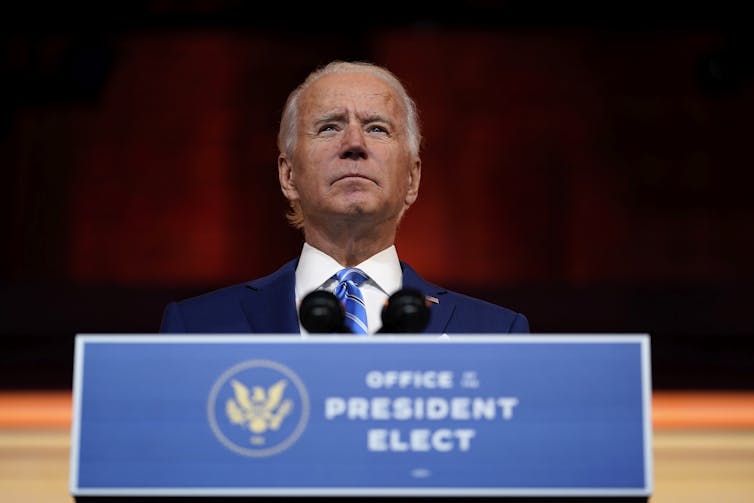Morrison remains very popular in Newspoll as the Coalition easily retains Groom in byelection
- Written by The Conversation
This week’s Newspoll will presumably be the final one for 2020. It gives the Coalition a 51-49% two-party-preferred lead, unchanged from three weeks ago. Primary votes were 43% Coalition (steady), 36% Labor (up one), 11% Greens (steady) and 2% One Nation (down one).
This is One Nation’s worst result in a federal Newspoll since before the 2019 federal election. It comes after the party slumped by 6.6 percentage points at the recent Queensland state election[1].
Newspoll figures are from The Poll Bludger[2]. This poll was conducted November 25-28 from a sample of 1,511 people.
Two-thirds of respondents said they were satisfied with Prime Minister Scott Morrison’s performance (up two points) and 30% were dissatisfied (down two), for a net approval of +36. Morrison’s approval rating has consistently been over 60% since April[3], following the initial outbreak of COVID-19 in Australia.
Labor leader Anthony Albanese recorded a net approval of +3, down one point. Morrison led as better PM by 60-28% (58-29% previously).
Read more: Why good leaders need to hold the hose: how history might read Morrison's coronavirus leadership[4]
Coronavirus may be the only important issue for many voters at the moment, and Morrison is perceived to have handled that well. In normal times, issues less favourable to the Coalition would likely have gained traction, undermining Morrison’s ratings, but these times are not normal.
NSW Premier Gladys Berejiklian has enjoyed a similar polling boost in her state as well, due to her handling of the pandemic.
In a NSW YouGov poll[5] taken after revelations of her affair with former Liberal MP Daryl Maguire, she still had a 68-26% approval rating.
LNP easily retains Groom at federal byelection
There was very little media attention on Saturday’s byelection[6] for the safe Coalition seat of Groom in Queensland.
Only four candidates ran, representing the Coalition, Labor, Sustainable Australia and the Liberal Democrats.
The LNP won[7] by 66.6-33.4%, a 3.9% swing to Labor since the 2019 federal election.
Read more: Final 2019 election results: education divide explains the Coalition's upset victory[8]
Primary votes were 59.0% for the LNP (up 5.6%), 27.8% for Labor (up 9.1%), 8.0% for Sustainable Australia and 5.3% for the Liberal Democrats. The major parties benefited from the absence of One Nation and the Greens, which respectively won 13.1% and 8.0% in 2019.
Analyst Kevin Bonham[9] says the average swing against a government at byelections in its own seats is 6%, so this is not a great result for Labor.
Furthermore, there was a 5.2% swing to the Coalition in Groom in the 2019 election[10], as it romped to a 58.4-41.6% drubbing of Labor[11] in Queensland.
If federal Labor had recovered support in Queensland since then, a much bigger swing would have been expected.
While Labor easily won the recent Queensland state election[12], state and federal voting can be very different.
Biden’s popular vote lead stretches
In the Cook Political Report[13] tracker of the national popular vote in the US presidential election, President-elect Joe Biden leads incumbent Donald Trump by 51.1-47.1%.
Biden’s four-point lead is up from 3.1 percentage points on November 8 when the states of Pennsylvania and Nevada were called for him[14], making him the presumptive winner. Many mail votes are still be counted in New York, which will heavily favour Biden as well.
 Biden came out on top in the Electoral College vote count, 306-232.
Carolyn Kaster/AP
Biden came out on top in the Electoral College vote count, 306-232.
Carolyn Kaster/AP
Biden’s popular vote margin now exceeds Barack Obama’s margin[15] of 3.9 percentage points in 2012. But Obama won the “tipping-point” state that put him over the magic 270 electoral college votes by 5.4 points, while Biden won his tipping-point state (Wisconsin) by just 0.6 percentage points.
Trump performed 3.4 percentage points better in the tipping-point state in 2020 than in the national popular vote and this difference will increase further as more New York votes are counted. In the 2016 election, the difference was 2.9 points.
Read more: What's behind Trump's refusal to concede? For Republicans, the end game is Georgia and control of the Senate[16]
In the House of Representatives[17], the Democrats lead the Republicans 222-206 in seats, with seven races uncalled.
Republicans lead in all seven of these uncalled races. If they hold their leads, Democrats will win the House by just 222-213. That’s a net gain of 13 seats for Republicans from the 2018 midterm election[18].
References
- ^ Queensland state election (theconversation.com)
- ^ The Poll Bludger (www.pollbludger.net)
- ^ April (theconversation.com)
- ^ Why good leaders need to hold the hose: how history might read Morrison's coronavirus leadership (theconversation.com)
- ^ NSW YouGov poll (theconversation.com)
- ^ Saturday’s byelection (www.brisbanetimes.com.au)
- ^ LNP won (tallyroom.aec.gov.au)
- ^ Final 2019 election results: education divide explains the Coalition's upset victory (theconversation.com)
- ^ Kevin Bonham (kevinbonham.blogspot.com)
- ^ Groom in the 2019 election (www.abc.net.au)
- ^ drubbing of Labor (theconversation.com)
- ^ recent Queensland state election (www.abc.net.au)
- ^ Cook Political Report (cookpolitical.com)
- ^ called for him (theconversation.com)
- ^ Barack Obama’s margin (en.wikipedia.org)
- ^ What's behind Trump's refusal to concede? For Republicans, the end game is Georgia and control of the Senate (theconversation.com)
- ^ House of Representatives (www.nytimes.com)
- ^ 2018 midterm election (en.wikipedia.org)
















